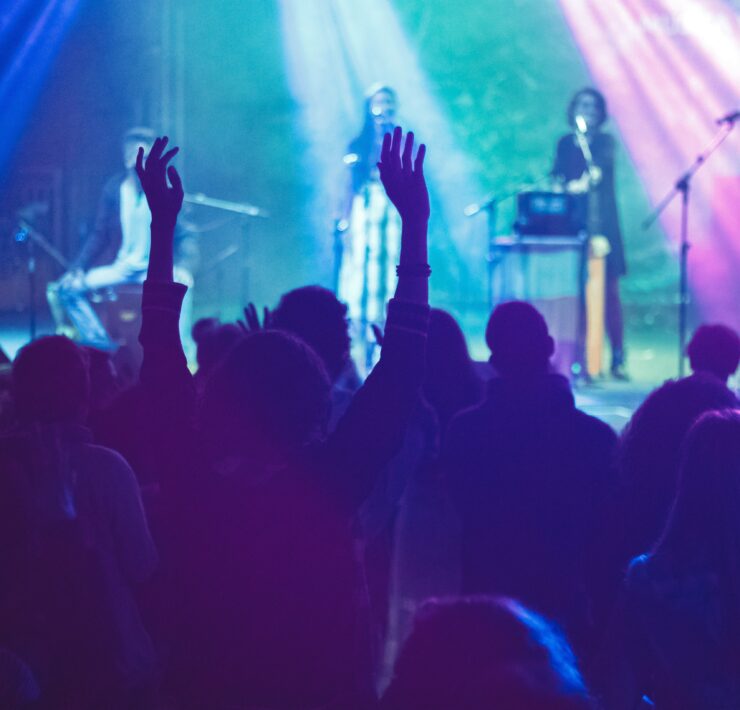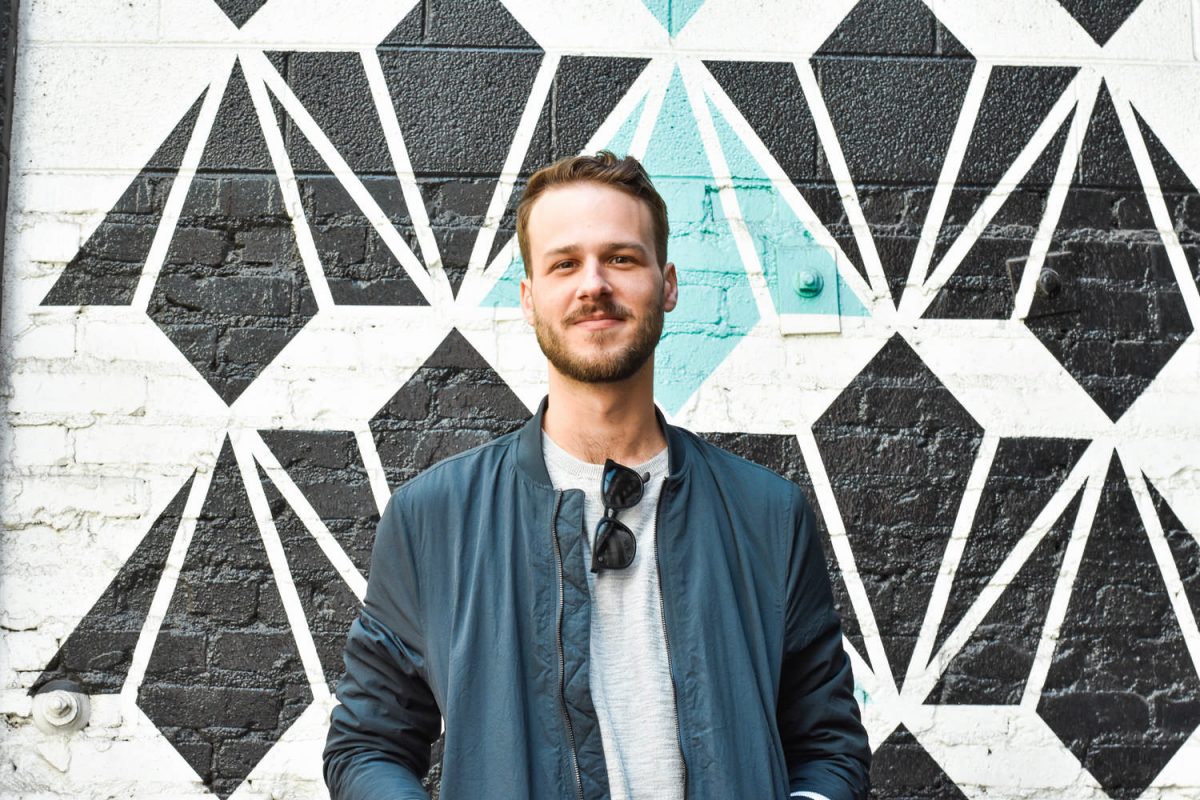Music is a Social Art Experiment with Annabelle Maginnis

Intersectionality, accessibility, and squashing the sexist, patriarchal norms through queer…
Breaking down and removing barriers, whether it’s ones she’s placed on herself or ones based on society’s expectations, is what Annabelle Maginnis is doing with her art and music. From repurposing plastic bags into art pieces to collaborating with artists she felt were unreachable, Maginnis has cultivated a life where the opinions of others don’t influence her journey and expression.
After just releasing a new, eight-track EP Free Debris with songs about self-acceptance and her coming out journey, Maginnis challenges folks to look beyond genres and labels and truly reflect on inspiration. Repurposing of waste, fluid identity, and inspiration from nature have inspired her project titled Free Debris and help her carry out her message of boundary-less expression.
Performing two different slots at this year’s Underground Music Showcase (Blue Ice, Saturday, 7/27 at 5 p.m. and Odyssey Stage, Sunday, 7/28 at 5:20 p.m.), this LA performer is ready to show the Mile High City how she creates a texture of sound through an immersive vision.
You just returned home to LA from a trip to Europe, how was the trip?
It was really fun! The trip was mainly to set up some meetings with artists who I hope to work with once I have a bigger budget and more momentum. I met with an artist in Berlin and we did a couple of tracks together, and then I met with a few different photographers and artists.

In collaborating with photographers, how important is your aesthetic and visual representation when it comes to your music?
I think the thing that is really powerful about working with photographers is that they pair the music with something that people may not know they’re hearing, kind of an extension. So, articulating that visually has been such a pleasure. I feel really empowered to be able to choose who I want to work with and articulate my own visual and audio aesthetic.
How would you describe your look and sound?
I guess the closest as far as genre with music is anywhere from indie to folk with neo-soul and jazz influences, and genres that are really rooted in counterculture things so it’s paired with some of the visuals that I’m often using. The project I did called Free Debris was visually taking items that people may not see as valuable and gratifying and using those discarded materials to then become something valuable.
The same is true with the music itself, I worked with a bunch of people who I’ve been friends with for a while but I didn’t realize that I had access to them. A lot of times, artists or people in general will put a barrier between themselves and what they want because they don’t think they’re good enough yet. Now, I’m giving myself permission and I might as well just ask, so it’s the whole aesthetic of tapping into what we already have, it’s just a matter of shifting focus a little bit.
How did you stumble into finding that shift in focus?
It took a really big life trial, about a year ago my roommate and really good friend passed away. It was really jarring and I asked myself, ‘What do I miss so much about him and what can I keep alive’ Something that I really appreciated about him was that he didn’t ask anybody else, ‘Am I good enough?’ It was really refreshing to be around someone who just asked for what they wanted, without invading anybody else’s space and without any expectations of whether or not he was even going to get it. He already felt complete with or without and I realized everyone has that capacity, he was just really onto something.
How did you get started in music?
I started playing violin when I was ten and I learned by using a call and response method, so it’s taught in the way that language is taught and that establishment really created access to a dialogue with music that immediately went beyond the music itself.
I moved to New York when I was 13 and started playing in symphony and orchestra, and I didn’t lie but I withheld the truth that I couldn’t read music. It was definitely really challenging but I’m so grateful for some of those challenges and the conviction that I had at a young age. It was an escape, music was a place where I felt that I couldn’t do something wrong and even though I was a perfectionist, I would really lean into some of the mistakes. If I look back at moments in my life when I was feeling repressed or oppressed or depressed, I wasn’t really playing as much but then I started to play the mandolin and it just kind of came naturally to start singing along with it.
How did you start incorporating the visual elements into your music?
When I was in college up in the bay area, there was a lot of nature that was accessible so I was mostly influenced by a lot of the visuals and the sounds around me. I think that it continues to
inform the visuals based on some of the shapes that happen through music, and that sounds a little bit esoteric but I paint and draw all of it informs itself. I was really focusing on watercolor when I started playing the mandolin and when people would ask me my biggest inspiration I would always say watercolor. The sound blends similarly to how the colors, shapes, and forms are similar to the patterns that the music constructs, so there isn’t a huge distinction for me.
How did those inspirational elements get incorporated into the new EP you just released?
Visual arts is like a social art because this was a project that I did that was completely collaboration based. I had previously recorded a bunch of my music completely alone and I was seeking to make an EP of just my own work. But then I did these collaborations, seemingly on the side just for fun, and it turned out to be much more beautiful and cohesive than I expected.
It ended up being more like a social collage versus any specific visuals that I had before that and the blending of different identities.
And this project was telling the story of your coming out experience?
That was actually just one of the tracks on there but then as I I looked deeper, I realized that so many of the songs are rooted in identity and who we are. The song called “Courage” is broken into three parts and I use literary references so that it feels like a story. It’s basically a story about the moment that I came out to my mom, which was actually only a little over a year ago, during Pride. I think family is often inexplicably challenging and it was really hard for me, but it made me reflect on how many people must have such a harder experience and how it was made so much easier because of all the people who have risked their lives to make this existence acceptable.

How do you prefer to identify?
I think bisexual is probably the title I would go with but I guess it’s close to pansexual. I think that there is a misconception that bi is exclusive to binary genders and is excluding of trans and nonbinary people, and that’s not my experience. I’m not sure if there is a perfect title but I’m queer, queer is a comfortable title for me.
Did you have any hesitation over being open about your sexuality?
I have this really strong community around me so I didn’t feel fearful. I definitely had experiences where I’ve felt fearful , even just this year I was traveling in Israel and I got stopped at the border for four and a half hours. All the people who were hetero-normative were not stopped and they even asked me, ‘Do you have a partner? What’s the gender of your partner?’ I didn’t answer them, I was like ‘I’m not going to answer that. Like, what does that have to do with the safety of the passengers on this flight?’ So, I know that when I leave my safety bubble of my queer community in Los Angeles that there are going to be a lot more challenges.
I also recognize that a lot of people’s identities are not visible, being queer isn’t something that’s necessarily visible, but I also feel a little bit dishonest in hiding it or not putting it out there because it does inform a lot of my experience. I’d rather just be honest and maybe not so safe then try to just a sheltered and safe, it doesn’t sound as impactful.
Do you ever feel pigeonholed or put into a category because you are openly queer?
I have been mostly hesitant not because of fear but because I want to be identified as a musician first, I care about it a lot. I don’t want to be considered a female musician, I don’t want to be considered a queer musician. Yes, I female and queer but I don’t want that identity to be what defines me. For a lot of people within my community maybe you get only put up on put on the lineup because you’re queer and people are trying to be more inclusive and they’re using you to check off the box.
You made a good point, the fact that being a woman in the music industry can put you into a category which alone can include or exclude you.
I work with people of all genders and my only qualification is that they’re going to be decent, respectful, and a nice person but It’s definitely there. There is a lot of like ‘machismo culture’ in the music industry in so many different areas of it and I think it’s really unfortunate.
You’re coming to Denver for the Underground Music Showcase, what can audiences expect in a live show?
I always like to do something where I strip back the performance and give a little bit of rawness but I don’t always know what to expect so I can’t tell everybody what they should expect!
*All photos by Fanny Chu
What's Your Reaction?
Intersectionality, accessibility, and squashing the sexist, patriarchal norms through queer pearls of wishful wisdom.








